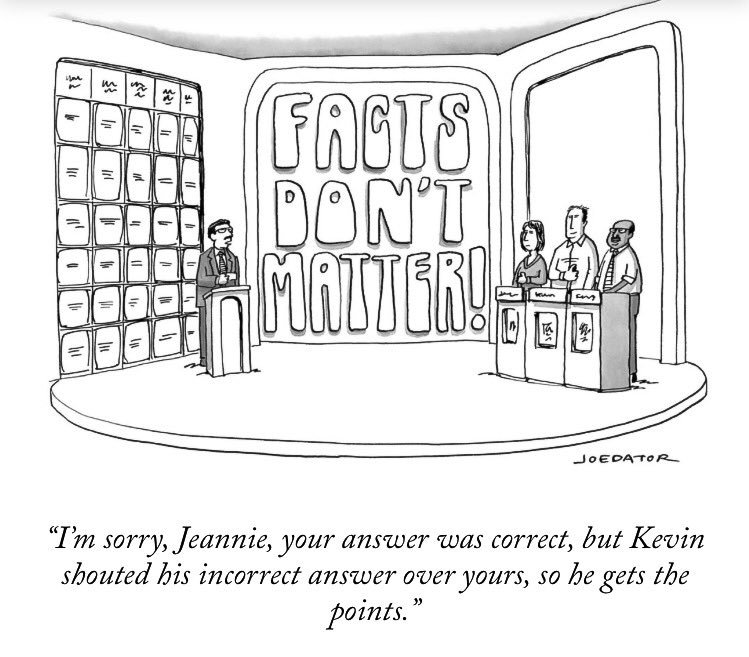Midway upon the journey of our life
I found myself within a forest dark,
For the straightforward pathway had been lost.
Ah me! All I could do was to begin at the beginning and ask what is true.
- Thursday, February 4: Truth and Politics
Discussion Theme: What does it mean to study the relationship between Truth and Politics?
At first glance, this question seems to have some easy answers. For example, one could say Truth is about facts, not lies. Politics is about whether politicians tell the Truth or simply lie. While both propositions are accurate, I believe that they only scratch the surface of much broader and much more interesting topic. Facts are important–indeed, in short supply these days among public officials!–but what we mean by Truth is even more profound. In a courtroom, one swears to tell the “whole truth and nothing but the truth” (see HERE). What is the whole truth? Similarly, when we pose a question about Politics, we are addressing an equally profound theme. If we are telling “the whole truth,” what does it mean to say we should tell “nothing but the truth”?
2. Tuesday, February 9: Telling the Whole Truth?
Discussion theme: What does it mean to tell the Whole Truth in a democracy?
In this section, we will begin to construct a vocabulary for our course by considering two types of cases in which Truth-telling is relevant to sustaining a healthy democracy. The first type is the deliberate distortion of the Truth. The second is–or may be, depending on your judgment–an example of not telling the whole Truth.
NOTE: These readings and videos represent different challenges to our pursuit of the Truth in a democracy. Ron Paul’s video is particularly interesting.
Deep fake video of Joe Biden admitting to voter fraud: WATCH
“Surge of Virus Misinformation Stumps Facebook and Twitter” PRINT AND READ
Sheera Frenkel and Davey Alba, Digital Edits, a Paid Army: Bloomberg Is ‘Destroying Norms’ on Social Media,” New York Times, February 22, 2020 PRINT AND READ
“Dr. Ron Paul’s Urgent Message for Every American” LISTEN, TAKE NOTES, CRITIQUE
3. Thursday, February 11: Democratic Citizenship
Discussion themes: What does Truth have to do with good citizenship? What are the responsibilities of a good citizen in a democracy?
Sophia Rosenfeld, Democracy and Truth: A Short History, Chapter I; and pp. 42-49 (specifically about Kant)
Rosenfeld provides valuable historical background on many of the themes, as well as many of the thinkers, that will occupy is for the next two weeks.
Immanuel Kant, “What is Enlightenment?” PRINT AND READ
In Kant’s short essay, we find some germs of the liberal democratic conception of citizenship. What does Kant mean by “enlightenment?” What does he mean by the obligation to act upon enlightened principles? How does he justify it?
What does it mean to be a good citizen in the US? Do Americans live up to their responsibility to be good citizens? Do you? If you don’t, does it matter?
Truth and Politics today:
John Gramlich, “What makes a good citizen? Voting, paying taxes, following the law top list,” Pew Research Center, July 2, 2019 READ
4. Tuesday, February 16: Truth and Liberty
Discussion theme: Sorry to say it, but none of us is infallible. This fact has direct implications for our understanding of politics. What role should the limitations on our capacity to know the Truth play in the design of a well-functioning liberal democratic polity? Conversely, why are authoritarian regimes not as concerned about the issue of human fallibility?
As you reader Mill, ask yourself: What are the strengths and weaknesses of his position? What might they teach us about the strengths and weaknesses of liberal democracy?
“On the Liberty of Thought and Discussion,” in John Stuart Mill, On Liberty (1869), ONLY chapter II: PRINT AND READ
Truth and Politics today:
Fox.com, “Fox News defends First Amendment Freedoms” READ And Fox’s adversaries come to its defense! READ
“BBC issues internal guidance on how to report climate-change,” carbonbrief.org READ Is the BBC the anti-Mill?
5. Thursday, February 18: Real-World Politics
Discussion theme: In dictatorships, politicians lie by habit, deception, and decree. Are we naive to expect that politicians will behave differently in liberal democratic polities? Also, is it always a bad thing when they lie?

In this section, I would like to cover two themes: 1) the argument that all forms of political organization are about nothing more than domination; 2) the defense of political lying instead of telling the Truth.
Excerpts from Machiavelli’s The Prince PRINT AND READ However, is Machiavelli arguing that rulers should have no other goal than to stay in power? To gain a more differentiated perspective, consider Machiavelli’s claims in these excerpts from his Discourses PRINT AND READ
Truth and Politics today:
“Obama’s pledge that ‘no one will take away’ your health plan,” Washington Post, October 30, 2013 PRINT AND READ (awarded four Pinnochios by the Post)
John Mearsheimer, Why Leaders Lie: The Truth about Lying in International Politics, pp. 3-20 RECOMMENDED

6. Tuesday, February 23: The First Great Debate!
Democrats lie, too!
Proposition: “President Obama had no choice. He had to lie to make the Affordable Care Act possible! As politicians in liberal democracies have recognized for the past two centuries, lying and great leadership go hand in hand.”
Background Readings
Consider the contrasting perspectives:
David Leonhardt, “The Original Lie about Obamacare” PRINT AND READ TO PREPARE FOR THE DEBATE
“Obama’s pledge that ‘no one will take away’ your health plan,” Washington Post, October 30, 2013 PRINT AND RE-READ (awarded four Pinnochios by the Post)
Debate Structure: TBA
7. Thursday, February 25: Great Writing and the Art of Persuasion
In preparation for your essay assignments in this course, let’s talk about what constitutes great writing.
I love George Orwell. Thus, I assign his writings, especially the two below, again and again. Seven decades after his death, Orwell continues to provide us with fresh insight into the study politics. As you will see, in “Politics and the English Language,” his argument is all about the ways in which words can be used and abused to justify dictatorship. The use and abuse of words plays a major role in American politics today.

Orwell also teaches us a lot about great writing. His books and essays are deceptively easy to read, but most people cannot write with the fluid, easily understandable, and totally persuasive style that he exemplifies. I wish I could! Still, I want you to try to emulate his example.
Readings from George Orwell:
“Politics and the English Language” PRINT AND READ Look at what Orwell has to say about both 1) the political uses and abuses of words; and 2) good writing.
“Why I write” PRINT AND READ This article is about both the personal motivations behind writing and the psychological factors that make great writing difficult.
George Orwell: Facsimile (handout)
Mystery Facsimile (handout)
Also consider the power of the words used by the Trump and Biden administrations. See Michael Shear, “The Words that are In and Out with the Biden Administration”: PRINT AND READ
MINI-BREAK: Tuesday, March 4
8. Thursday, March 4: Political Experts Rule
Discussion theme: What role should expertise play in liberal democratic politics?
The goal of this session is to examine the idea of expertise in politics and the way that political elites use it to justify their rule over ordinary citizens.
Sophia Rosenfeld, Democracy and Truth A Short History, Chapter II, pp. 42-72.
James Madison and/or Alexander Hamilton, Federalist Papers, nos. 10, 49, 57, 58 PRINT AND READ
Truth and politics today:
Jeffrey Rosen, “America is Living James Madison’s Nightmare” PRINT AND READ
9. Tuesday, March 9: Bringing the People in!
Sophia Rosenfeld, Democracy and Truth A Short History, pp. 72-91
John Dewey, The Public and its Problems, Chapter V, “The Search for the Great Community” LOCATE HERE AND PRINT
(Hesburgh also has two on-line versions. To ensure that you have no problem finding it, print the chapter the first time you see it; the publishers may not let you “take it out” again)
Truth and politics today:
The Notre Dame community: How are we doing? “HERE” at HERE (You are the People)
10. Thursday, March 11: Looking Back
At this point in our course, we have covered a lot of material, a lot of thinkers, and a lot of themes. Today, we will take the time to look back at this material and see how it all fits together.
Our goal is to engage in a comparative discussion of all of the thinkers we have encountered: Machiavelli, Kant, Mill, Orwell, Madison and Hamilton, and Dewey. We can do this by comparing and contrasting their views on the following subjects:
-
-
- The nature of truth
- How one pursues the truth
- Human nature and truth
- The good society
- The relationship between the truth and the good society
-
.
Your First Essay Assignment is Here
